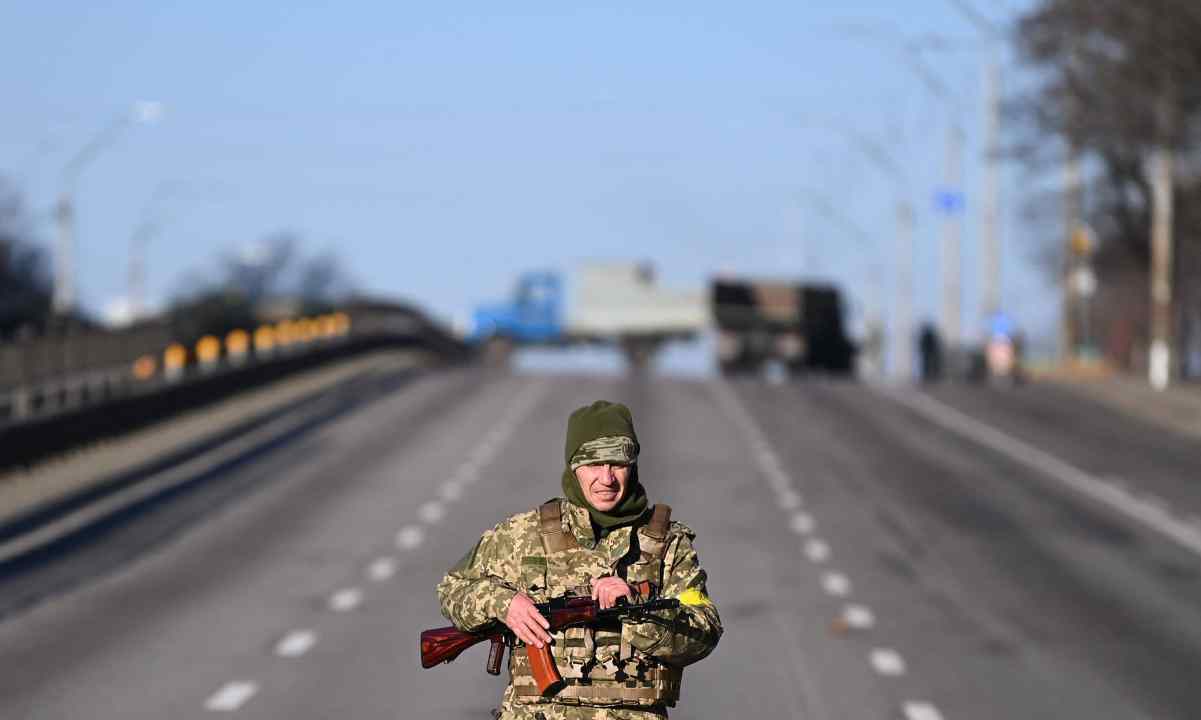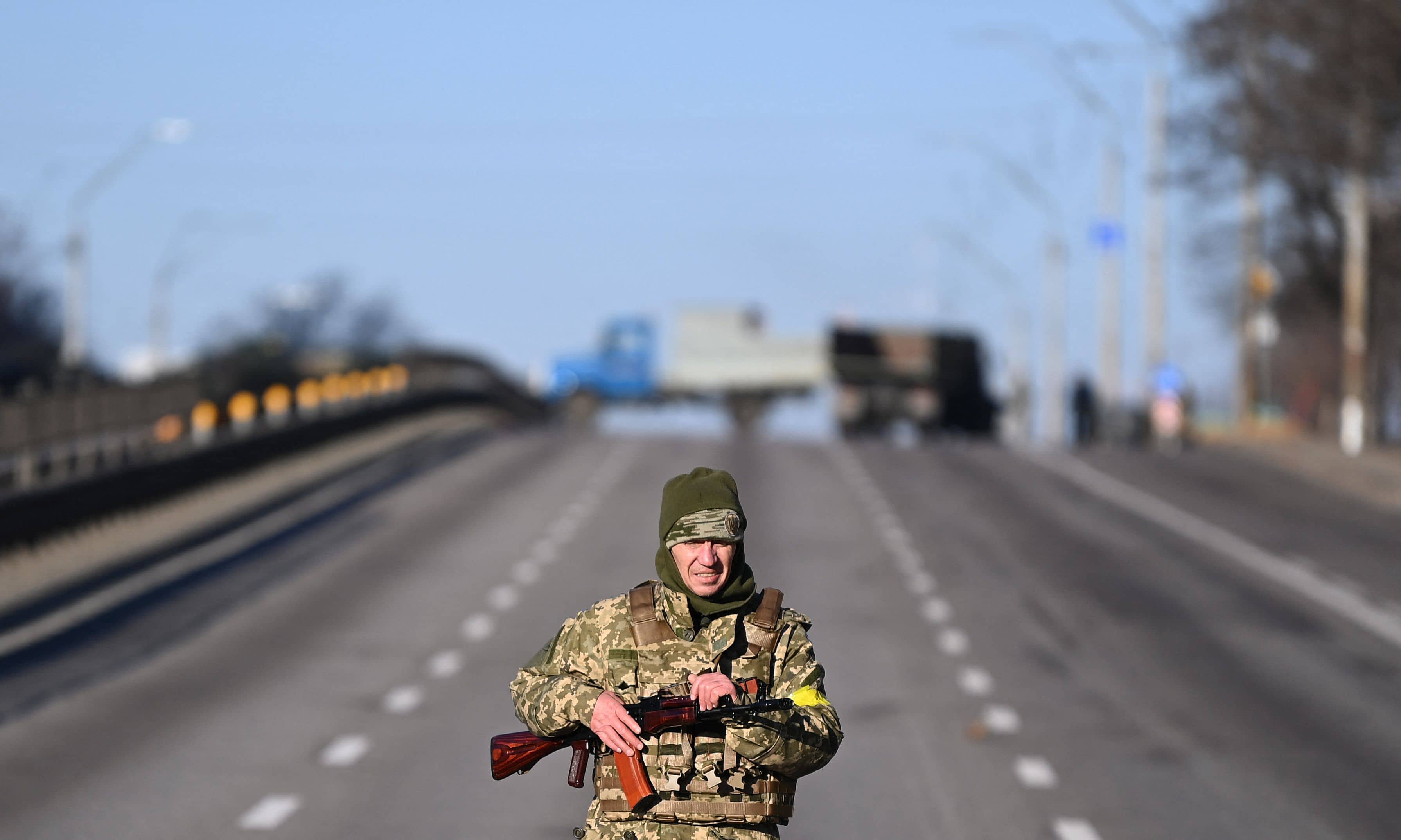Lviv, Ukraine
Russian troops have yet to reach the centre of Kiev. Instead, locals have two more immediate concerns: saboteurs and looters.
Photos shoot across messaging groups. One shows a huddle of supposedly Russian agents caught in a metro station, along with an eviscerated teddy bear in which they were hiding rifle cartridges. The Ukrainians believe that saboteurs have been in most cities since January, marking out key infrastructure and military targets. Another photo shows an agent bound and gagged with masking tape. Blood streams from his head.
The looters don’t fare much better. A paunchy man has his wrists cable-tied around a utility pole, his belt used to strap his knees against it. His underpants are round his ankles, his expression suggests that he has seen better days. Other looters are beaten and forced to strip naked in the snow. But it’s the Russians who really suffer. The crews of broken-down tanks are said to have been lynched by locals. I ask a Ukrainian how they feel about the Russian soldiers. ‘I see the fear and hopelessness in these young guys,’ Maryna tells me, ‘But it’s no good – they have no honour and no moral belief.’
Getting out of Kiev is not an easy task. Chances come and go like an intermittent radio
Getting out of Kiev is not an easy task. Chances come and go like an intermittent radio. When the 39-hour curfew expired on Monday morning, many took the opportunity to leave. Generously offered a lift by a TV crew, and not knowing how long I could be stuck in Kiev, I decided to take my chance.
We drove south out of the city in a convoy of two vans through streets that were empty except for the snaking queues outside every supermarket. Once in open country, we waited to pass the numerous Ukrainian checkpoints.
At the barrel of a gun, our documents are checked time and time again. The hunt for saboteurs is a popular pastime in the countryside too. I know one Russian who has been living in Ukraine for years and is now unable to leave his village for fear his non-Ukrainian numberplate will provoke angry locals.
The day before war breaks out, a taxi driver asks me if I am in Ukraine to fight. I tell him I’m here for a Russian language course. Young westerners with dreams of fighting are met with polite appreciation, but also some bemusement.
I ask Maksim about the volunteers – including a gym owner from Surrey and a Canadian student with haemophilia. He’s doubtful that they’ll be much help, especially when they can’t speak Russian or Ukrainian, and have neither arms nor military training. Even young Ukrainians are being turned away.
What Ukrainians do want is weapons. At one checkpoint we’re asked if we have any. At another, we’re told to hand over any drones. Whatever can be used will be used against the invader. Old hunting shotguns are a common sight at rural checkpoints.
As the hours push on and we’re still miles from Lviv, there is a slight panic about the 10 p.m. curfew. Sleeping in the TV vans is not an appealing prospect. The crew is worried about getting Covid. I’ve been surprised by how many Ukrainians are still wearing masks indoors. Surely the prospect of Russian artillery might put the pandemic into perspective.
In the end we make it to Lviv with some breakneck driving and overtaking manoeuvres that pose a far greater threat to life than the now-distant Russian army.
With every Russian escalation, the Ukrainian attitude hardens further. ‘They are using Chechnya tactics,’ Borislav angrily tells me, ‘They are going to turn Kharkiv into Aleppo.’ The Kremlin might want to avoid the Chechen comparison. One widely-shared meme claims that more Russian soldiers have died in Ukraine in just a few days than in the entire first Chechen war. It suggests it will soon be more than the roughly 7,500 that died in the second Chechen conflict in 1999.
Meanwhile, the presence of Chechen fighters is used to strike fear into the population. Unlike their Slavic comrades, they’re are far less concerned about spilling Ukrainian blood. Although the rumour is that a Chechen special forces unit sent to kill Zelensky has apparently been ‘eliminated’.
The text messages keep flying. One of the most popular examples is screenshots of the texts between a Russian soldier and his family, recovered from his phone after his death. The soldier documents his terror and confusion to his parents who think he’s still on a training exercise. Ukraine’s ambassador to the UN read out one such exchange to the assembly in New York. Borislav is sceptical. It’s just a little too good to be real, he says, but it’s propaganda that speaks the truth.
At 3 a.m. yesterday I receive an email from the British Embassy, who don’t know I have already left Kiev, telling me there is a UN convoy leaving the city at 9 a.m. which I can join at my own risk if I have my own vehicle. Perhaps it’s time to leave Ukraine altogether, but a part of me wants to remain among these brave people.







Comments